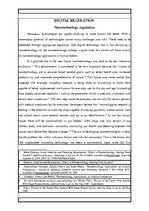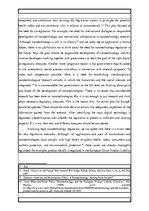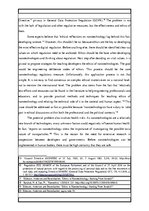-
Nanotechnology Regulation
Drawing to a close, we can see that nanotechnology regulation isn’t sufficient. There are many unsolved problems that concern digital regulation (as a whole). Mainly problems stem from unsolved ethical concerns. This issue is the base from which nanotechnology should be regulated. When there are clear ethical guidelines, it shouldn't be problematic to develop safe, environment friendly technologies that aren't compromising human health or privacy. On the contrary, are helping humans to feel safe, are minimising health risks, and overall make everyday life easier. To reach this goal, extensive research in all the concerning areas and international collaboration is the key. The result should be the engineering of deliberate codes of ethics in the nanotechnologies. Legislation should only be the shell that protects from the unethical use of nanotechnologies. From a legislative point of view, certain issues already should have been addressed. This issue is privacy. At the EU level, GDPR has proven that it is not that easy to safeguard privacy in this digital era. People should know how exactly their private data is used and have the power to limit it. There also should have been implemented harsher legislative sanctions. This would give the right incentive to protect privacy and not misuse nanotechnology potential. In conclusion, it can be said that nanotechnologies have tremendous potential for helping people, but this technology must be appropriately regulated. …
Nowadays, technologies are rapidly evolving to make human life better. With the tremendous potential of technologies comes many challenges and risks. These need to be addressed through appropriate regulation. One digital technology that is fast advancing is nanotechnology. As the nanotechnology concept is quite wide, this article will focus mainly on nanotechnology applications in human bodies. It is possible that in the near future ''nanotechnology may lead to the next industrial revolution.'' This advancement is considered to be very important because the ''visions of nanotechnology are to advance broad societal goals, such as better health care, increased productivity, and improved comprehension of nature.'' This future may come sooner than expected. For example, nowadays research is being done on microchips to make them capable of being implemented into humans for everyday use. In this day and age ''microchips have already advanced medically – such as the pacemaker which is used only in patients with certain heart conditions''. The next step would be everyday use not only for certain persons with medical conditions but for everyone.







